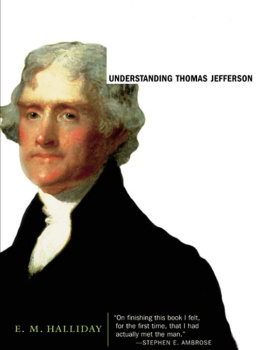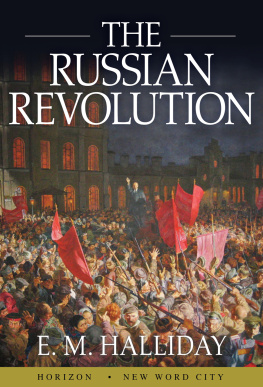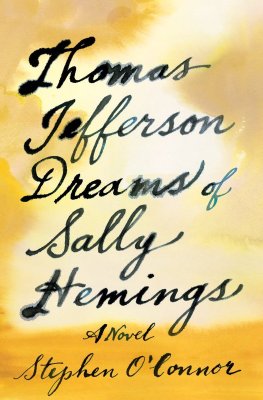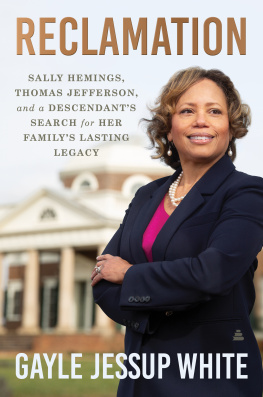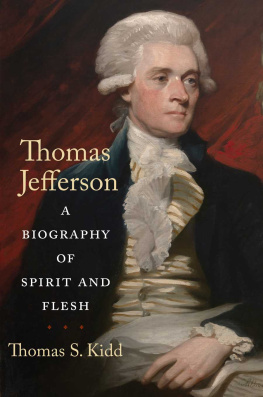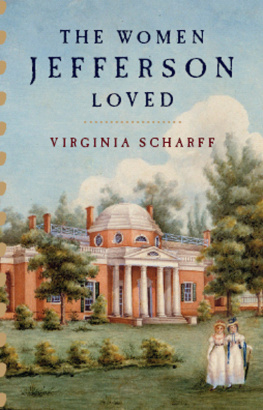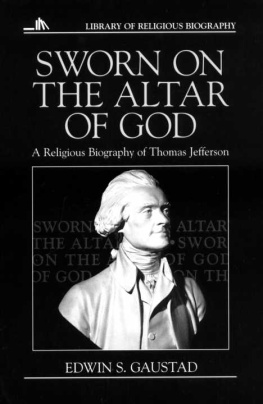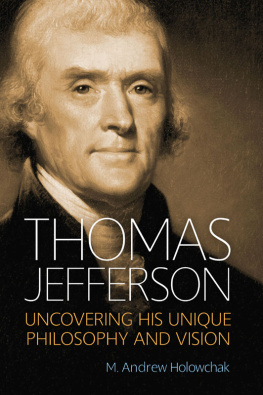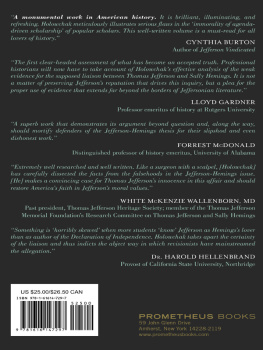Understanding
THOMAS
JEFFERSON

E. M. Halliday

To the memory of Fawn Brodie
CONTENTS

PerfectBound e-Book Extra:
My Head and My Heart
(Jefferson's Letter to Maria Cosway; Paris, October 12, 1786)

The prevailing tendency in Jefferson biography in recent years has been to regard him as a man of such contradiction and paradox as to be, in the end, essentially a puzzle, an enigma. The subtitle of The Inner Jefferson, by Andrew Burstein (1995), was Portrait of a Grieving Optimist, which itself proclaims a paradox; and in 1997 the National Book Award for nonfiction went to a biography by Joseph J. Ellis called American Sphinx: The Character of Thomas Jefferson. As everyone knows, a sphinx symbolizes an unsolvableor at least extremely difficultriddle.
Jefferson was unarguably a complicated man, and there are indeed many puzzling aspects to his character. How could a man who became world famous as a champion of human freedom, the author of the Declaration of Independence and its timeless all men are created equal, have been a lifelong and large-scale slave master, possessing hundreds of slaves almost none of whom he ever freed? How could a man who repeatedly asserted his disgust for sexual mixing of the races have taken as his concubine one of his own slaves, the beautiful and very young Sally Hemings? Yet in the autumn of 1998 careful DNA tests revealed a high scientific probability that Jefferson had indeed fathered the last one of Sallys children, which along with circumstantial evidence strongly suggested that he fathered them all. (Joseph J. Ellis, although he thereupon hastily reversed his view on the paternity question, declared that the new evidence only deepens and darkens Jeffersons image, and that he is nowmore a sphinx than ever before.)
That remains to be seen. In any case, there are lots of other puzzles to be looked into. For example, since Jefferson was forever telling his daughters and his friends how much he hated politics and longed to retire to the pastoral pleasures of Monticello, how did it happen that he spent half his life in government service of one kind or another, and in the process founded one of the most powerful and successful political parties the United States has ever known? Why was it that, although he professed a firm belief in God, he was all his life fiercely antagonistic to organized religion? Why, although he often expressed great admiration and respect for cultivated and attractive women, was he in fact what almost any feminist today would denounce as a male chauvinist?
Enough examples. The view taken in this book is that the sphinx approach to Thomas Jefferson tends to mystify rather than enlighten, and can lead to badly skewed misinterpretations. I believe that his contradictions and paradoxes are reasonably understandable when observed in the light of his personal and social circumstances, and considered in the light of common human experience. Unquestionably, he was a man whose character was far from perfect; but who among us can claim to be otherwise?
He fell short of living up to his own ideals; but the ideals he stood for and championed were very high and very American. Although he was by nature and breeding an aristocrat, he ardently believed in government of the people, by the people, and for the people, made possible by complete freedom of thought and expression. These things, I think, are what largely explain the hold he continues to have on public interest in this country and worldwide.
Beyond this, it is relevant to notice how do-it-yourself-American was the way he arrived at his beliefs about religion, morality, sex, race, slavery, government, science, education, and the pursuit of happiness, among other things. For if ever there was a man who disdained conventional wisdom and insisted on working these things out for himself on the basis of his own tireless reading and thinking, Thomas Jefferson was such a man.
The first half of this book aims to be a short yet fairly comprehensive sketch of Jeffersons whole life, with the focus more on the personal and private than the public and political. The second half consists of a series of closely-related essays on crucial topics such as his almost symbolic feud with Alexander Hamilton; his views on slavery and race; the surprising distortions to be found in some of the most distinguished biographies; Jeffersons literary taste, moral philosophy, and religion; his adamant opinions on women; his ideas about democracy, freedom of expression, and education, plus an estimate of his place in American history; and finally, a rumination on history versus historical fiction.
I hope he emerges not as an enigma, but as a Founding Father who, all things considered, clearly deserves his place on Mount Rushmore.
1
The Vaunted Scene
of Europe

In June 1782, a few months after he had proudly played a crucial role in the defeat of Cornwallis at Yorktown, Virginia, Marie-Joseph-Paul-Yves-Roch-Gilbert du Motier, the Marquis de Lafayette, was an honored guest at possibly the most lavish full-dress ball that Marie-Antoinette, Queen of France, had ever given at Versailles. Still only twenty-four, Lafayette was already a general in both the American and the French armies, and lionized in both countries. A startling amalgam of ultra upper-class French snobbery and passionate dedication to libert and the rights of man, he had gone to help the American cause entirely on his own, even purchasing outright (from an exceedingly large fortune) the vessel that took him there. Now, back in his native land, he dances a quadrille flawlessly (according to an observer) with the young queen in the Gallery of Mirrors, which scintillates with the reflected light of five thousand candles. The king has gone to bed, but his twenty-seven-year-old blue-eyedconsort and diamond-bedecked entourage of courtiers dance, sip, and sup the night away, finally wandering off to one bed or another as the sun is rising and the peasants of the metropolis are trudging sullenly to their ill-paid travailif they are so lucky as to have jobs at all.
The sexual mores of this haut monde, on the fringe of which widower Thomas Jefferson, the newly appointed American minister to France, soon was to find himself, are rather touchingly hinted at by the story of Lafayettes marriage. It had been arranged by his noble family and the more or less equally noble family of his bride, Adrienne de Noailles, and took place when she was fourteen and he sixteen. Quite to the surprise of both families and probably of the adolescent couple themselves, they promptly fell in love, and stayed much that way until her death, thirty-three years later. Yet when they entered Parisian society soon after the wedding, young Lafayette almost immediately realized that he lacked one thing essential to being perceived as la mode: a mistress. This was quickly remedied, and Adrienne, although she adored Gilbert, did not complaineither then or as the succeeding years brought a train of other mistresses.
Such a combination of true conjugal affection and extramarital gallantry, however, was unusual. About the time of the queens great ball in 1782, there appeared a book that became an instant bestseller. Les Liaisons dangereuses , published almost but not altogether anonymously under the initials C[hoderlos] de L[aclos], depicts the sexual adventures of two wickedly attractive nobles, the fictitious Vicomte de Valmont and the Marquise de Merteuil, who, having become jaded with their own love affair, have now entered into a ferocious contest to see which one of them can more viciously ruin the happiness of other human beings by luring them into deep erotic intrigues and then betraying them. Their sadistic pleasure is derived not through inflicting physical pain, but by deliberately breaking hearts and arousing suicidal despair. There is nothing more diverting, says Mme. de Merteuil, than the misery of the lovelorn, and Valmont wolfishly agrees. The book, though not quite pornographic,was found to be enormously exciting by literate Parisians, and the first edition sold out rapidly, to be followed by many others, some of them pirated. Marie-Antoinette, aware that her courtiers were feverishly reading it, acquired a copy that she had specially bound with no title on the binding, perhaps to avoid the notice of her royal husband.
Next page
